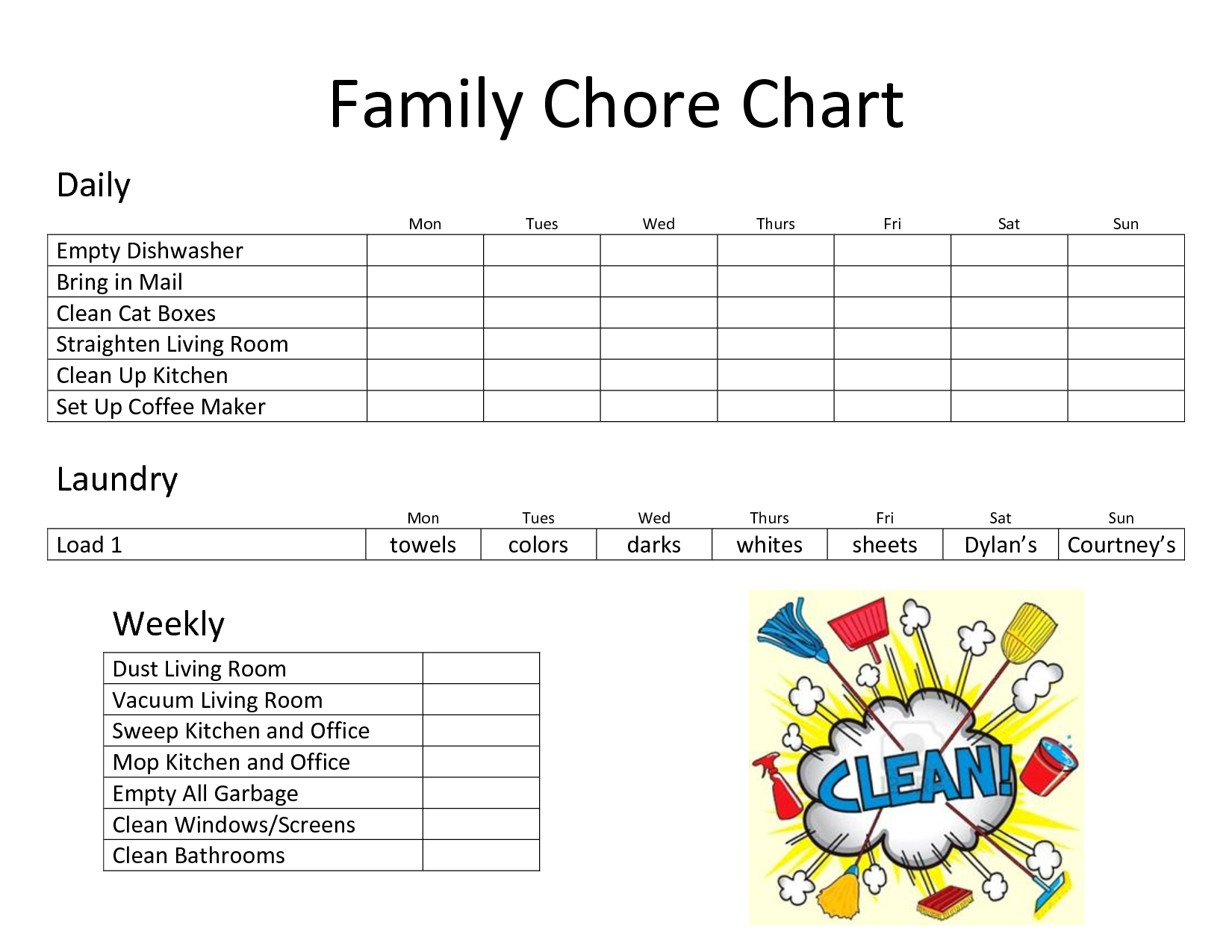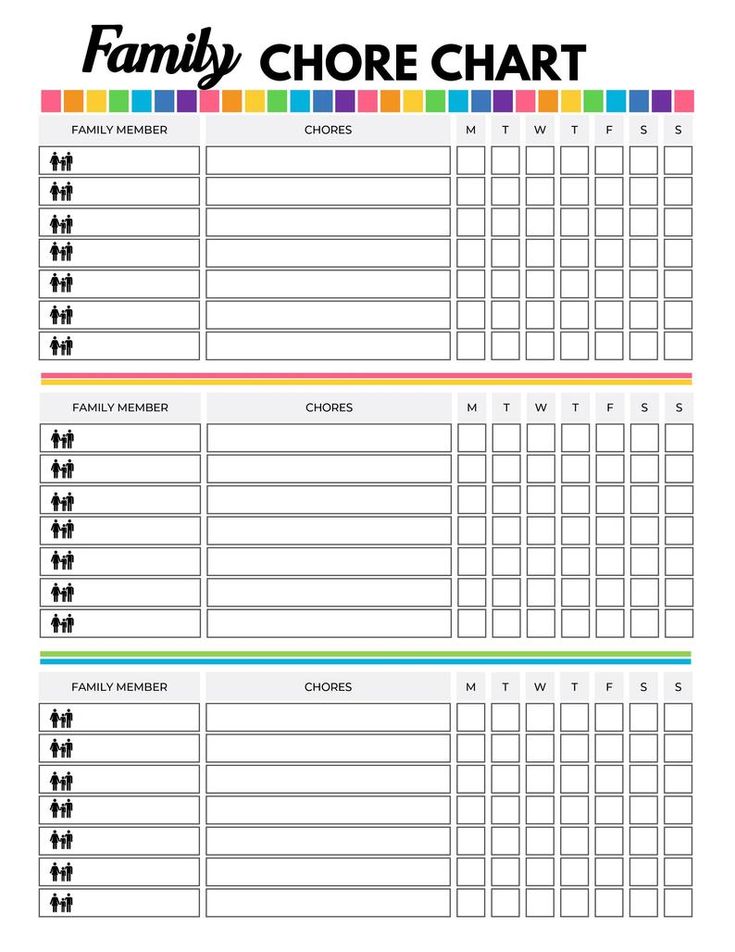
What is a Family Chores Chart?
A family chores chart is a visual tool that helps distribute household tasks among family members. It provides a clear outline of who is responsible for what chores, helping to foster a sense of teamwork and responsibility within the family. By using a family chores chart, parents can teach their children valuable life skills, promote independence, and maintain a clean and organized home.
Why Should You Use a Family Chores Chart?
Implementing a family chores chart can bring numerous benefits to your household. Here are some compelling reasons why you should consider using one:
- Promotes accountability: With a chores chart, everyone in the family knows their responsibilities and is accountable for completing them.
- Teaches life skills: Assigning age-appropriate chores to children helps them develop essential life skills like time management, organization, and problem-solving.
- Reduces parental burden: By involving everyone in household tasks, parents can lighten their workload and have more time for themselves.
- Fosters teamwork: Working together as a family to accomplish chores promotes teamwork and a sense of unity.
- Builds independence: When children are assigned specific chores, they learn to take responsibility for their tasks and become more self-reliant.
How to Create a Family Chores Chart
Creating a family chores chart doesn’t have to be complicated. Follow these steps to make an effective and personalized chart for your family:
1. Determine the Chores
Start by making a list of all the household tasks that need to be done regularly. Consider both daily chores, such as making beds and washing dishes, and weekly or monthly chores, such as vacuuming or cleaning windows. Make sure to assign age-appropriate tasks to each family member.
2. Allocate Responsibilities
Next, assign specific chores to each family member based on their age, capabilities, and interests. It’s important to distribute the workload fairly, taking into account everyone’s abilities and limitations. Be open to negotiation and adjust the assignments as needed.
3. Create a Chart
There are several options for creating a family chores chart:
- Traditional chart: Use a large poster board or a whiteboard and divide it into sections for each family member. Write down the assigned chores, and you can use stickers or markers to mark when a chore is completed.
- Printable templates: Many websites offer free printable chore charts that you can customize and print at home. This option provides a neat and organized layout.
- Mobile apps: There are various chore-tracking apps available that allow you to assign and track chores digitally. These apps often come with additional features like reminders and reward systems.
4. Set Rules and Expectations
Communicate the rules and expectations regarding the family chores chart. Explain how often the chores should be done, what constitutes a completed chore, and any consequences for not fulfilling responsibilities. It’s important to establish a consistent routine and stick to it.
5. Provide Motivation and Rewards
To keep everyone motivated, consider implementing a rewards system. This can be as simple as giving praise or small incentives for completing chores. Create a system that works for your family, whether it’s a sticker chart, a point system, or a weekly allowance tied to chore completion.
6. Regularly Review and Adjust
Periodically review the family chores chart to ensure it is still effective and fair. As children grow older or gain new skills, their assigned tasks may need to be adjusted. Keep the lines of communication open and encourage feedback from all family members.
Sample Family Chores Chart




Here is an example of a family chores chart to give you an idea of how it can be organized:
- Parent 1: Cooking dinner, grocery shopping, laundry
- Parent 2: Taking out the trash, mowing the lawn, cleaning the bathroom
- Child 1 (age 10): Setting the table, feeding the pets, sweeping the floors
- Child 2 (age 6): Making the beds, watering the plants, picking up toys
Remember to adjust the chores based on your family’s specific needs and the age and abilities of your children.
The Benefits of Using a Family Chores Chart
Using a family chores chart offers numerous benefits for both parents and children:
1. Encourages Responsibility
Assigning chores and holding children accountable for completing them instills a sense of responsibility from a young age. Children learn that their actions contribute to the functioning of the household.
2. Develops Time Management Skills
By having specific tasks with deadlines, children learn to manage their time effectively. They understand the importance of completing their chores promptly, which can translate into better time management skills in other areas of life.
3. Promotes Independence
When children are responsible for their own chores, they become more independent and self-reliant. They learn to take initiative and complete tasks without constant supervision.
4. Builds a Strong Work Ethic
Regularly contributing to household tasks teaches children the value of hard work and perseverance. They understand that success comes from putting in consistent effort.
5. Strengthens Family Bonding
Working together as a family to accomplish chores can create bonding opportunities. It fosters a sense of teamwork and unity as everyone contributes to the well-being of the household.
Conclusion
A family chores chart is a valuable tool for instilling responsibility, teaching life skills, and maintaining a harmonious and organized home. By following the steps outlined in this guide, you can create a personalized chart that works for your family. Remember to regularly review and adjust the chart as needed, and provide motivation and rewards to keep everyone engaged. With a family chores chart, you can create a positive and efficient chore routine that benefits the whole family.
Family Chores Chart Template – Download